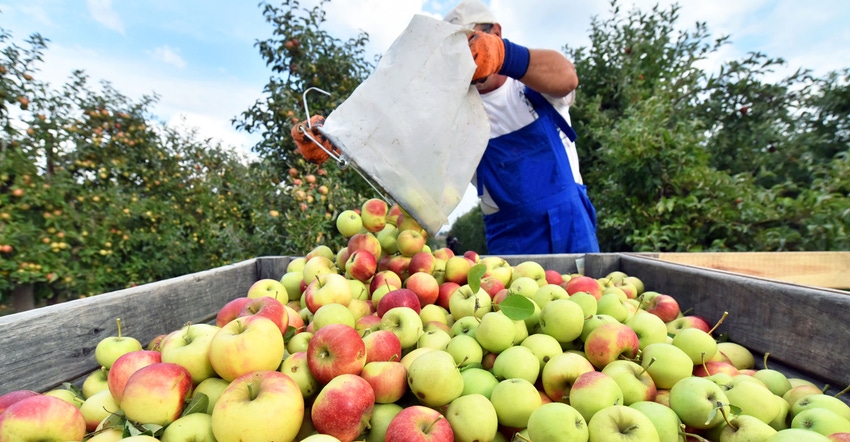
New York Farm Bureau will not appeal a court decision that granted the state’s farmworkers the right to collectively bargain.
Steve Ammerman, spokesman for Farm Bureau, says the decision comes in light of the recently signed Farmworkers Fair Labor Practices Act.
“In light of the farm labor bill legalizing collective bargaining for farmworkers, our state board decided not to proceed with the appeal,” he says.
In May, the Supreme Court Appellate Division, the second-highest court in the state, ruled that farmworkers have a constitutional right to collective bargaining rights, overturning a previous court ruling.
But Farm Bureau, which is a co-defendant in the case, vowed to appeal the decision to the state’s highest court, the Court of Appeals.
The case goes back to 2016 when farmworker Crispin Hernandez, the Workers Center of Central New York, the Worker Justice Center of New York and the New York Civil Liberties Union sued the state after Hernandez was fired from one of the state’s largest dairies. New York Farm Bureau was granted intervenor status and was a co-defendant in the case.
Hernandez claims that his employer, located in Lewis County, fired him after seeing him meeting with coworkers and a labor organizer to discuss workplace conditions. The meeting took place after work hours and in a worker’s home.
New York Farm Bureau argued in court that the State Employment Relations Act, which excludes farmworkers from collective bargaining rights, is constitutional.
The New York Civil Liberties Union has argued that the act is the product of segregationist politics enacted in the 1930s and that it violates the state’s constitution.
New law, new labor rules
Now that the Farmworker Fair Labor Practices Act is now the law in New York, farmers will have new labor rules to keep in mind when hiring farmworkers.
The new law allows farmworkers to be paid overtime if they work more than 60 hours a week. It also grants farmworkers one day off a week or be paid overtime for working that day.
It also grants farmworkers the right to worker’s compensation, and it establishes a Farm Laborers Wage Board that will meet in 2020 to further study the overtime issue in the state and possibly lower the 60-hour overtime threshold.
Farms that employ immediate family members are exempt from the overtime rule.
Farmworkers will also be allowed to organize and form unions but will not be allowed to strike.
The new law goes into effect Jan. 1, 2020.
Ag community reacts
Many in the ag community are unhappy about the new law.
Grow NY Farms, a coalition of more than 50 New York-based farms, local businesses and organizations, including New York Farm Bureau, says the law will pose hardships for some farms.
The coalition wants four things in the law to be modified:
Apply a standard wage rate for farmworkers who decide to work on the prescribed day of rest.
Expand the family farm definition to include close relatives such as aunts, uncles, nieces, nephews and cousins.
Modify the composition and timeline of the wage board.
Preserve secret balloting for both farmworkers and farmers.
"It is upsetting that state lawmakers have placed rural New York at a serious disadvantage in our ability to compete in the marketplace and provide economic opportunities for our employees,” says Brian Reeves of Reeves Farms in Baldwinsville and president of the New York State Vegetable Growers Association. “This new law failed to take common sense into account and, in turn, will place upstate further behind in its ability to grow our farms and economy. Our farms and farmworkers deserved better for all that they provide this state.”
Bruce Krupke, executive vice president of Northeast Dairy Foods Inc., says the new law is a blow to the ag community.
“Legislators supporting the bill call it ‘truly historic.’ Unfortunately, it will be in that costs of food and other products for consumers will eventually rise due to the higher cost of production,” he says. “This legislation will not help keep farmers in business. In fact, the opposite will occur. It will further erode even faster the agriculture industry and threaten dairy product and other food manufacturing as well in our state.”
Possible economic effects
New York state is just the fifth state in the country to require mandatory overtime pay on farms.
A Farm Credit East report states that ag labor costs could rise 17.2% if farmers must pay overtime. Combine that with the rise in minimum wage — $12.50 by 2021 for upstate New York and $15 for New York City and Long Island — and labor costs could rise by $299 million a year. The report estimates it could reduce net farm income by 28%
The report states that only 28% of farms have hired labor, but those farms generate 80% of the state’s gross farm income.
Supporters of the legislation have argued that the effects of overtime pay will be minimal given the fact that most farms don’t employ anyone or only employ family members, of which immediate family members are exempt from the overtime provision.
About the Author(s)
You May Also Like






